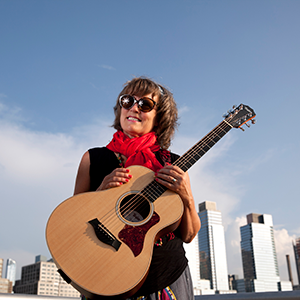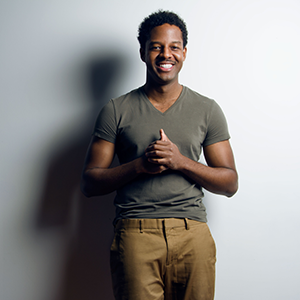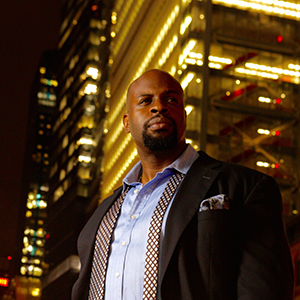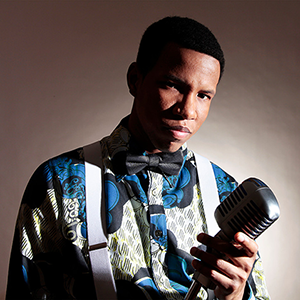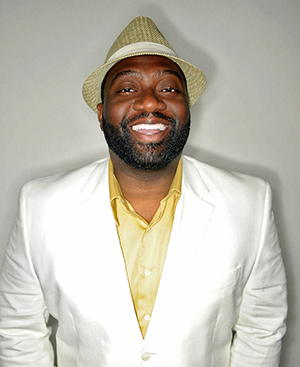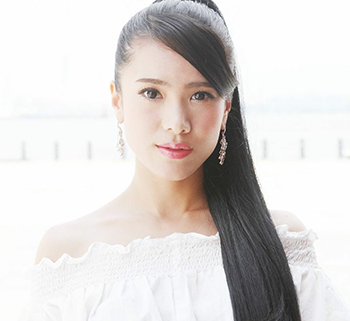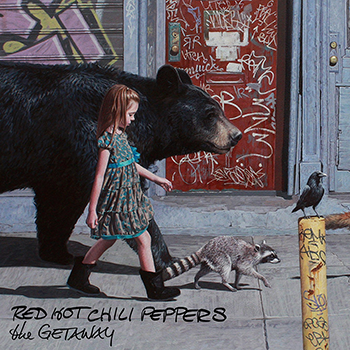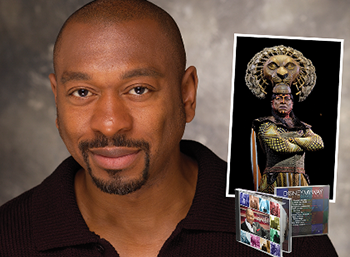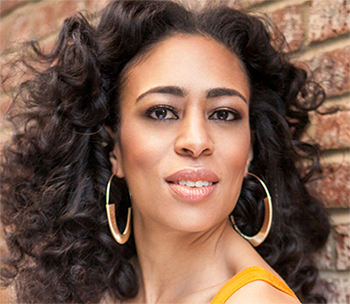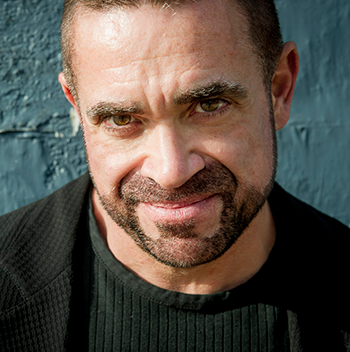On Saturday, April 15, at Central Library, we hope you will join us for Twister, a performance of American songs with a Chinese twist! Our stage will be graced by musicians Feifei Yang, Marlon Cherry, Garry Dial, and the legendary Terre Roche.
Terre Roche is a celebrated singer-songwriter, guitar player, teacher, author, and founding member of the successful musical trio The Roches. She's worked with Paul Simon, Philip Glass, and Linda Ronstadt, among plenty others. Terre has performed in many clubs and concert halls throughout the U.S. and Europe, and appeared on numerous TV shows over the course of her 45-year career. She's currently a member of the band Afro-Jersey and co-creator (with Garry Dial) of Us An' Them, a collection of national anthems from 16 nations. Terre is also the author of Blabbermouth, a memoir about her surprising coming-of-age journey as a female musician in the 1970s.
We were very happy to have the chance to speak with Terre before her upcoming performance.
What role have libraries played in your life?
When we were kids, my sisters and I used to play a game where we pretended we were librarians. We were intrigued by the way they stamped the books when you checked them out! Later on, when my sister Maggie and I were hired to go on tour, I had to leave high school in my senior year. The school arranged for me to write all my term papers and take all my exams, even though I was traveling all over the United States instead of sitting in a classroom. I went to the libraries at the various colleges we performed at on the tour and did all the research for my term papers. And (now I'm bragging) I graduated third in my class, thanks to those college libraries.
What can our customers expect at your upcoming event here at Queens Library?
Twister's performance at Queens Library will include a selection of American folksongs, Chinese folksongs, original songs by all three of our members, and some popular songs. We have tried to incorporate Western elements into the Chinese songs and Chinese elements into the Western songs. Mainly, we've picked songs we like to play because of their beautiful melodies and meaningful lyrics.
The “Twister” concept is very interesting. How did you, Feifei Yang, and Marlon Cherry come up with it?
I have always been attracted to the sound of the erhu. Two years ago, I bought one and went to a place in Chinatown that teaches Asian arts called the Mencius Society. My good fortune was that Feifei Yang was assigned to be my teacher. We hit it off from the first lesson. She is a very open musician, up for exploring all kinds of music. When I was contacted about playing at Queens Library, I thought it would be great to work something up with Feifei. Marlon Cherry is a multi-instrumentalist, singer-songwriter, and fellow member of the trio Afro-Jersey with me. We've worked together in different musical settings over many years. I always enjoy working with Marlon. And our special guest Garry Dial is a brilliant jazz pianist who always makes me sound good in whatever musical waters I wander into.
Which performers and albums have inspired your career as a musician?
I love all kinds of music. I was a big fan of Van Morrison when I was a teenager. Paul Simon was a mentor to my sister Maggie and me. He gave us our start many years ago. About 35 years ago, I bought a cassette tape on the street labeled "Chinese Classical Music." The rest of the label was in Chinese, so I'm not sure what it was called. But I played that cassette a thousand times. And I think that's the first time I ever heard the erhu. The cassette didn't survive my many moves over the years, and alas I don't have it now. I wish I did so Feifei could tell me what the label says!
You’ve dedicated your performance here at the Library to your late sister Maggie. We’re sorry to hear about her passing. Can you talk about the experience of being in a musical group with your sisters?
Interviewers used to ask me what it's like to sing in a group with my sisters, and I'd say, "What's it like to not sing in a group with your sisters?" My sister Maggie and I played together for eight years before we ever had a music lesson or played with anyone else but each other. She had an uncanny gift for songwriting as a teenager. Our duo got discovered and sent on tour when we were 17 and 18 years old. We had quite an adventure. I think that's when I got hooked on playing music. But playing music for me came to mean playing with my family.

Terre Roche plays the erhu for some feathered friends.
You’ve worked with several famous performers during your 45-year career, including Queens native Paul Simon. Any favorite stories you’d like to share?
I can't even begin to say what a debt I owe to Paul Simon for his very generous influence on Maggie and me when we started out. He took us under his wing and helped produce our first album, Seductive Reasoning. He allowed us to come to the studio and watch him make his record There Goes Rhymin' Simon. He taught me a lot about music. I don't think I really understood his profound connection to Queens until last year, when I saw his concert at Forest Hills. I'm so glad I was there. When he sang "Me and Julio Down By the Schoolyard," the entire stadium leapt to its feet.
What are some of your favorite books and who are your favorite authors?
I love The Grapes of Wrath and Of Mice and Men, both by John Steinbeck. The Yearling by Marjorie Kinnan Rawlings is a favorite. Whenever I need a good cry, I read the last page of that one. I've enjoyed Bel Canto by Ann Patchett, Nostromo by Joseph Conrad, and Shakespeare’s Julius Caesar. Cutting Through Spiritual Materialism by Chogyam Trungpa Rinpoche is a book that changed the course of my life. This is a very difficult question to answer! I have many beloved books. But what I’ve noticed is that at different times in my life, I'm receptive to different books. I have yet to “crack the code” with Virginia Woolf or Ezra Pound, but I have dear friends chipping away at me on those fronts. I've gone down in flames trying to read each of them!
What advice do you have for someone who wants to be a professional musician?
I think it's better to play music because you have a passionate desire to play music. The music profession can kill your desire. Music belongs to everyone. There's no limit to exploring music. You will never get to the end of it. But the profession of music, like all professions, is dependent upon your ability to make money, rather than your ability to play music. Music is a discipline. It enriches your life; it helps you to stay sane and live your life. Don't make the mistake of sacrificing it to the money-making machinery of the music business unless you're absolutely sure that's what you want to do.

